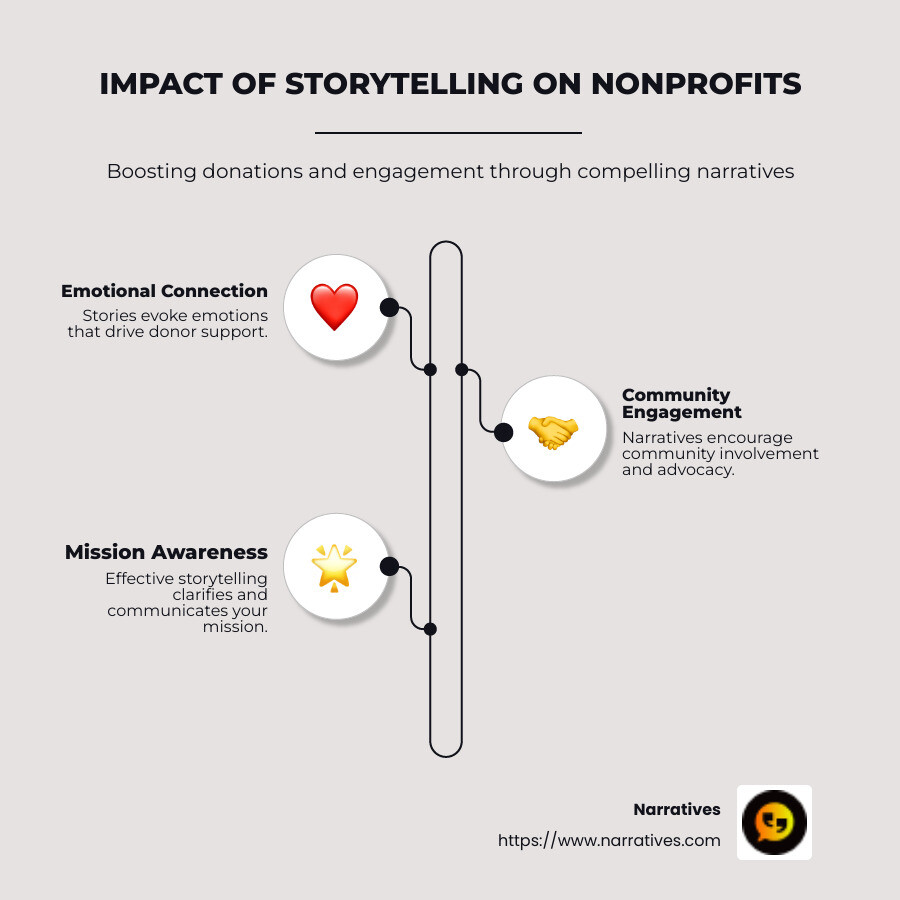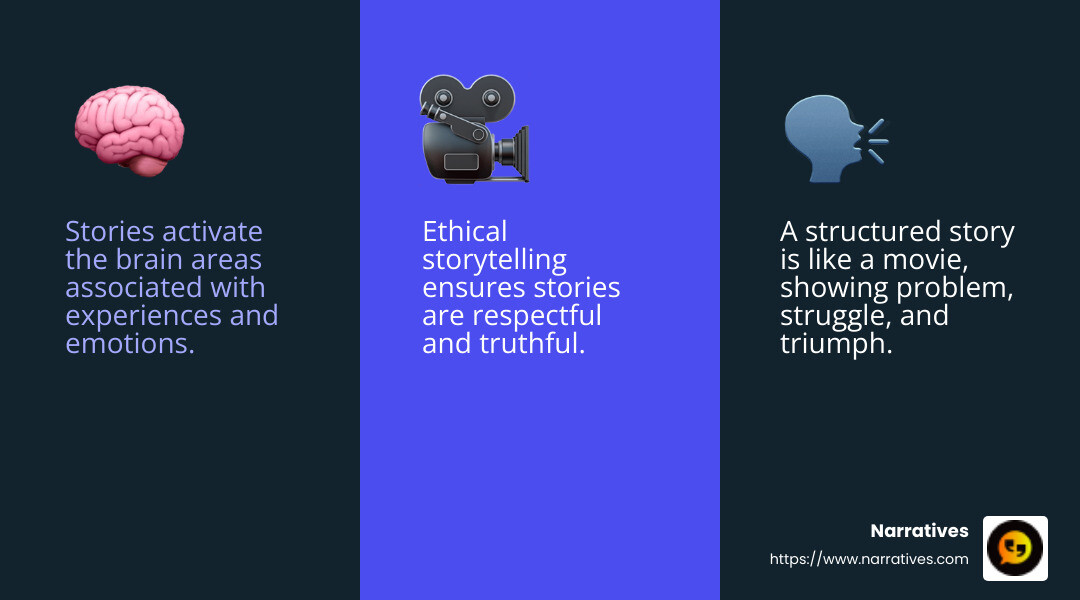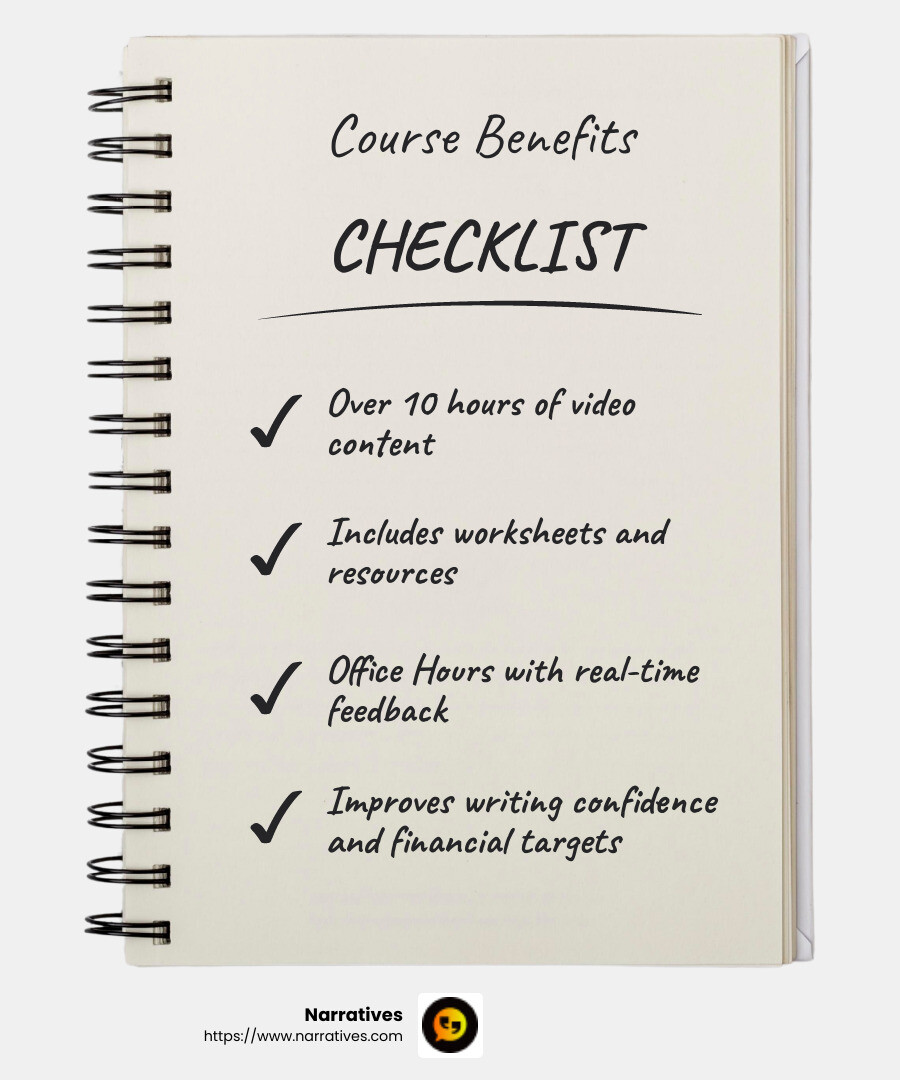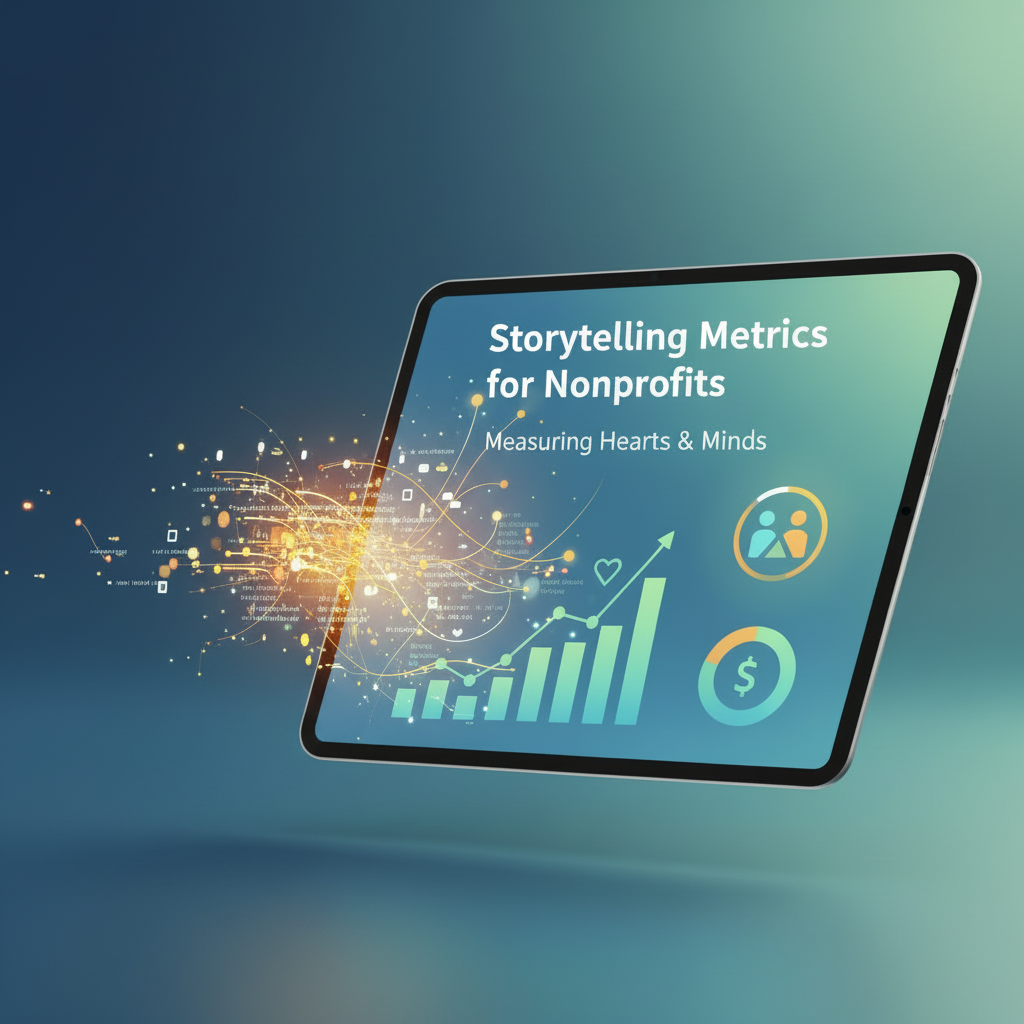Tales of Change: The Best Workshops for Nonprofit Storytelling

Nonprofit storytelling workshops are changing the way organizations connect with their audiences. For nonprofits to thrive, crafting stories that engage and resonate is essential.
- Storytelling Power: Harness the emotional pull that storytelling offers.
- Nonprofit Impact: Communicate the mission and galvanize support effectively.
- Audience Engagement: Engage audiences by positioning them as heroes in your narrative.
Imagine a world where your nonprofit's goals aren't just statistics but vivid stories that inspire action. As one professional aptly noted, "For many organizations, story is currency."
Nonprofit storytelling workshops equip you with the tools to transform your mission into compelling narratives. These workshops offer insights into crafting stories that not only capture hearts but also turn listeners into passionate supporters. You'll learn techniques to frame your story ethically and effectively, fostering a deep connection with your community.

Understanding Nonprofit Storytelling
Crafting a compelling story is like constructing a bridge between your nonprofit and its audience. This bridge is built on three main pillars: story structure, audience resonance, and ethical storytelling.
Story Structure
Every good story has a beginning, middle, and end. In nonprofit storytelling, this structure helps convey your mission clearly. Start with a hook to grab attention. This can be an emotional or surprising fact about your work. Then, introduce the challenge or issue your nonprofit addresses. Finally, conclude with a resolution, showing how support from donors or volunteers makes a difference.
Think of it like a movie where the audience gets to see the problem, the struggle, and the triumph. This structure not only informs but also inspires action.
Audience Resonance
To connect with your audience, your story must resonate with them. This means understanding what they care about and framing your story in a way that aligns with their values.
Consider the emotional journey of your audience. Use vivid language and sensory details to bring your story to life. This engages not just the language processing parts of the brain, but also those associated with emotions and senses. As research shows, when people listen to a story, their brains react as if they are experiencing the events themselves.

Ethical Storytelling
Ethical storytelling ensures that the stories you tell are respectful and truthful. It's about representing the people you serve with dignity and avoiding one-dimensional portrayals.
A diverse group of nonprofit professionals emphasizes the importance of being constituent-first and donor-second. This means highlighting the voices and experiences of those you serve, not just using their stories for fundraising.
Workshops often cover the tenets of ethical storytelling to help you steer this aspect. They teach you how to set the stage for authentic stories and ensure that all narratives are shared with consent and respect.
By mastering these elements, your nonprofit can craft stories that not only inform but also inspire and engage, changing listeners into advocates for your cause.
Nonprofit Storytelling Workshops
Nonprofit storytelling workshops are a powerful way to improve your organization's storytelling skills. These workshops focus on interactive exercises, real-world examples, and narrative framing techniques to help you create compelling stories that resonate with your audience.
Interactive Exercises
Workshops often include hands-on activities that allow participants to practice storytelling in a supportive environment. These interactive exercises help participants develop their storytelling skills through practice and feedback. For example, in a workshop setting, you might engage in a story circle where each participant shares a short narrative. This exercise not only builds confidence but also fosters a sense of community among attendees.
Real-World Examples
Learning from real-world examples is another key component of effective storytelling workshops. These examples illustrate how successful nonprofits have used storytelling to achieve their goals. For instance, consider the case of Essmaani, a nonprofit that supports hospitalized families in Tunisia. By effectively utilizing their Facebook page, developed through a training workshop, they managed to gain significant support and funding. This real-world success story demonstrates the impact of strategic storytelling and social media use.
Narrative Framing Techniques
Workshops also teach narrative framing techniques to help you structure your stories effectively. This involves setting the context and ensuring your story aligns with your organization's mission. For instance, the "Telling Tales of Impact" workshop emphasizes the importance of "setting the table" to get the story you want. This means preparing your narrative in a way that highlights the challenges and successes of your work, making it relatable and engaging for your audience.
By participating in these workshops, nonprofit professionals can learn how to craft stories that not only inform but also inspire and engage their audience, ultimately driving support for their cause.
Top Workshops for Nonprofit Storytelling
The Storytelling Non-Profit Master Class
The Storytelling Non-Profit Master Class, led by Vanessa Chase Lockshin, is an online class that focuses on enhancing storytelling skills specifically for fundraising. Vanessa brings her expertise as an international non-profit consultant and author of The Storytelling Non-Profit: A Practical Guide to Telling Stories that Raise Money and Awareness. Her Master Class offers a comprehensive, step-by-step process for creating stories that resonate with potential donors and increase donations.
This course is delivered through over 10 hours of instructional video content, along with worksheets and resources to help you implement what you learn. A standout feature of this class is the Office Hours with Vanessa, where participants can ask questions and receive real-time feedback. Alumni like Janice Haskell from the Dreams InDeed Foundation have praised the course for helping them meet financial revenue targets and improving their writing confidence.

Telling Tales of Impact: A Workshop for Nonprofit Leaders
Led by Lisa Nelson-Haynes, Telling Tales of Impact is a virtual workshop designed to open up the power of compassion and inspire change through nonprofit storytelling. Lisa, Chief of Program Officer at StoryCorps, has experience in empowering individuals to take control of their stories. This workshop focuses on narrative framing techniques to connect with stakeholders like donors and board members.
The workshop emphasizes the importance of "setting the table" to craft stories that truly reflect the heart and soul of an organization's mission. By highlighting real-life stories of resilience, hope, and change, participants learn how to foster empathy and understanding among their audience.
The Writer's Workshop
The Writer's Workshop is a two-week online course also taught by Vanessa Chase Lockshin. This workshop is specifically designed for fundraisers, communications professionals, and executive directors who want to improve their copywriting skills for fundraising purposes. Each day, participants receive a short video lesson along with worksheets and resources to help them apply the lessons learned.
The Writer's Workshop provides a private online classroom with interactive discussion threads and monthly coaching calls. This format allows participants to engage deeply with the material, practice their writing, and receive valuable feedback. By the end of the course, attendees have a toolkit of writing techniques that can significantly improve their storytelling and fundraising efforts.
Benefits of Nonprofit Storytelling Workshops
Nonprofit storytelling workshops offer a wealth of benefits that can significantly improve an organization's impact. Here are some key advantages:
Donor Engagement
Engaging donors is crucial for any nonprofit. Effective storytelling can transform passive supporters into active participants. Workshops like the Storytelling Non-Profit Master Class teach organizations how to craft stories that resonate emotionally, making donors feel like heroes in the narrative. This emotional connection increases donor loyalty and encourages more generous giving.
“Stories allow us to simulate intense experience without having to actually live through them,” says Lisa Cron in Wired for Story. This immersive experience fosters a deeper connection between donors and the causes they support.
Community Building
Nonprofit storytelling workshops also play a vital role in community building. By learning narrative framing techniques, organizations can create stories that highlight shared values and collective goals. Workshops like Telling Tales of Impact focus on using real-life stories of resilience and change to build empathy and understanding among audience members.
These stories act as a bridge, connecting various stakeholders such as donors, board members, and constituents. This sense of community encourages collaboration and support, creating a unified front for tackling social issues.
Mission Communication
Communicating a nonprofit's mission effectively is essential for inspiring action. Workshops provide tools and strategies for conveying complex missions in a way that is both compelling and understandable. By using ethical storytelling techniques, nonprofits can ensure that their narratives are authentic and respectful, enhancing credibility and trust.
For instance, the Writer's Workshop equips participants with copywriting skills that help translate a nonprofit's mission into clear, persuasive language. This not only helps in fundraising but also in rallying support for various initiatives.
By participating in these workshops, nonprofits can open up the power of storytelling to engage donors, build communities, and communicate their mission more effectively. This leads directly into the next section...
Frequently Asked Questions about Nonprofit Storytelling Workshops
What are the key elements of effective nonprofit storytelling?
Effective nonprofit storytelling hinges on a few critical elements:
Emotional Resonance: Stories should evoke emotions that connect donors to the cause. As noted in Wired for Story, “Stories allow us to simulate intense experience without having to actually live through them.” This emotional connection is essential for engagement.
Authenticity: Authentic stories build trust. They should be true to the organization's mission and respectful of the people involved. Ethical storytelling, as taught in workshops, ensures narratives are both genuine and respectful.
Narrative Structure: A well-structured story has a clear beginning, middle, and end. It should introduce a challenge, show the journey, and highlight the impact. This structure helps audiences relate and understand the significance of the nonprofit's work.
Audience Focus: Effective storytelling considers the audience's perspective. Stories should be custom to resonate with the specific values and interests of donors, volunteers, and other stakeholders.
How can storytelling increase donations for nonprofits?
Storytelling can be a powerful tool to boost donations by:
Building Emotional Connections: When donors feel emotionally connected, they are more likely to contribute. Stories that highlight personal journeys and successes make donors feel part of the solution.
Demonstrating Impact: Stories that clearly show the impact of donations can motivate donors to give more. Workshops like the Storytelling Non-Profit Master Class teach how to craft stories that showcase tangible outcomes.
Creating a Sense of Urgency: Compelling narratives can create urgency, prompting immediate action. By framing stories around pressing needs, nonprofits can encourage timely donations.
Enhancing Donor Loyalty: Consistent storytelling keeps donors engaged and invested in the cause, increasing the likelihood of long-term support.
What should I look for in a nonprofit storytelling workshop?
When choosing a nonprofit storytelling workshop, consider the following:
Expert Instructors: Look for workshops led by experienced professionals. For example, Lisa Nelson-Haynes, who leads the Telling Tales of Impact workshop, brings a wealth of knowledge and experience in narrative framing.
Practical Exercises: Workshops should offer hands-on activities that allow participants to practice storytelling. Interactive exercises help solidify learning and build confidence.
Real-World Examples: Look for workshops that use real-life examples to illustrate storytelling techniques. This helps participants see how concepts apply to actual nonprofit scenarios.
Focus on Ethics: Choose workshops that emphasize ethical storytelling to ensure narratives are respectful and authentic.
Customization and Relevance: Ensure the workshop content is relevant to your organization's mission and audience. Custom advice and strategies can make a significant difference in effectiveness.
By selecting the right workshop, nonprofits can improve their storytelling skills, leading to more effective communication and increased donor engagement.
Conclusion
In the changing landscape of nonprofit communication, Narratives stands out as a crucial partner for organizations aiming to amplify their impact through digital storytelling. By focusing on elevating underrepresented voices, we help nonprofits craft stories that resonate deeply and inspire action.
Digital storytelling is more than just a tool; it's a bridge that connects people to causes. It allows nonprofits to share their impact in a way that is both emotionally engaging and visually compelling. For instance, as highlighted in our Storytellers for Change initiative, storytelling workshops have empowered thousands of youth and educators to share their narratives, fostering empathy and building inclusive communities.
Our approach at Narratives is grounded in the belief that every story has the power to transform. By working closely with nonprofits, we create high-quality multimedia content that showcases their missions and achievements. This not only builds trust but also increases visibility, ensuring that the stories of those often unheard are brought to the forefront.
By choosing to partner with us, nonprofits can leverage the power of storytelling to engage donors, strengthen community ties, and drive meaningful change. Whether through workshops, consulting, or multimedia content creation, Narratives is committed to helping organizations tell their stories in the most impactful way possible.
Join us in making your nonprofit's story a guide of change. Let's work together to ensure that every voice is heard and every story is told.


